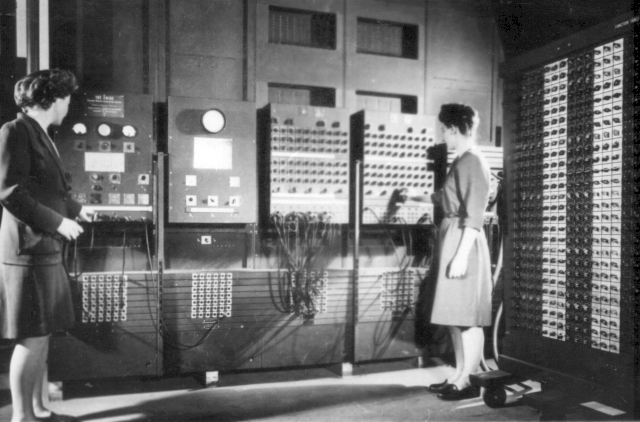
Moore School of Electrical Engineering
Encyclopedia
The Moore School of Electrical Engineering at the University of Pennsylvania
came into existence as a result of an endowment from Alfred Fitler Moore on June 4, 1923. It was granted to Penn's School of Electrical Engineering, located in the Towne Building. The first dean of the Moore School was Harold Pender
.
The Moore School is particularly famed as the birthplace of the computer industry:
 The Moore School has been integrated into Penn's School of Engineering and Applied Science
The Moore School has been integrated into Penn's School of Engineering and Applied Science
. It no longer exists as a separate entity; however, the 3-story structure itself still stands and is known on campus as the Moore School Building. Originally constructed in 1921 as a two-story building by Erskin & Morris, it was renovated in 1926 by Paul Philippe Cret
and a third story was added in 1940 by Alfred Bendiner.
.
University of Pennsylvania
The University of Pennsylvania is a private, Ivy League university located in Philadelphia, Pennsylvania, United States. Penn is the fourth-oldest institution of higher education in the United States,Penn is the fourth-oldest using the founding dates claimed by each institution...
came into existence as a result of an endowment from Alfred Fitler Moore on June 4, 1923. It was granted to Penn's School of Electrical Engineering, located in the Towne Building. The first dean of the Moore School was Harold Pender
Harold Pender
Harold Pender was an American academic, author, and inventor. He was the first Dean of the University of Pennsylvania's Moore School of Electrical Engineering, a position he held from the founding of the School in 1923 until his retirement in 1949...
.
The Moore School is particularly famed as the birthplace of the computer industry:
- It was here that the first general-purpose turing complete digital electronic computer, the ENIACENIACENIAC was the first general-purpose electronic computer. It was a Turing-complete digital computer capable of being reprogrammed to solve a full range of computing problems....
, was built between 1943 and 1946. - Preliminary design work on the ENIACENIACENIAC was the first general-purpose electronic computer. It was a Turing-complete digital computer capable of being reprogrammed to solve a full range of computing problems....
's successor machine the EDVACEDVACEDVAC was one of the earliest electronic computers. Unlike its predecessor the ENIAC, it was binary rather than decimal, and was a stored program computer....
resulted in the stored program concept used in all computers today, the logical design having been promulgated in John von NeumannJohn von NeumannJohn von Neumann was a Hungarian-American mathematician and polymath who made major contributions to a vast number of fields, including set theory, functional analysis, quantum mechanics, ergodic theory, geometry, fluid dynamics, economics and game theory, computer science, numerical analysis,...
's First Draft of a Report on the EDVACFirst Draft of a Report on the EDVACThe First Draft of a Report on the EDVAC was an incomplete 101-page document written by John von Neumann and distributed on June 30, 1945 by Herman Goldstine, security officer on the classified ENIAC project...
, a set of notes synthesized from meetings he attended at the Moore School. - The first computer courseMoore School LecturesTheory and Techniques for Design of Electronic Digital Computers was a course in the construction of electronic digital computers held at the University of Pennsylvania's Moore School of Electrical Engineering between July 8, 1946 and August 30, 1946, and was the first time any computer topics had...
was given at the Moore School in Summer 1946, leading to an explosion in computer development all over the world. - Moore School faculty John MauchlyJohn MauchlyJohn William Mauchly was an American physicist who, along with J. Presper Eckert, designed ENIAC, the first general purpose electronic digital computer, as well as EDVAC, BINAC and UNIVAC I, the first commercial computer made in the United States.Together they started the first computer company,...
and J. Presper EckertJ. Presper EckertJohn Adam Presper "Pres" Eckert Jr. was an American electrical engineer and computer pioneer. With John Mauchly he invented the first general-purpose electronic digital computer , presented the first course in computing topics , founded the first commercial computer company , and...
founded the first computer companyEckert-Mauchly Computer CorporationThe Eckert–Mauchly Computer Corporation was founded by J. Presper Eckert and John Mauchly, and was incorporated on December 22, 1947. After building the ENIAC at the University of Pennsylvania, Eckert and Mauchly formed EMCC to build new computer designs for commercial and military applications...
, which produced the UNIVACUNIVAC IThe UNIVAC I was the first commercial computer produced in the United States. It was designed principally by J. Presper Eckert and John Mauchly, the inventors of the ENIAC...
computer.

University of Pennsylvania School of Engineering and Applied Science
The School of Engineering and Applied Science, also known as SEAS, is one of the four undergraduate schools of the University of Pennsylvania. The School offers a boutique approach to the study of engineering in that its programs emphasize hands-on study of engineering fundamentals while...
. It no longer exists as a separate entity; however, the 3-story structure itself still stands and is known on campus as the Moore School Building. Originally constructed in 1921 as a two-story building by Erskin & Morris, it was renovated in 1926 by Paul Philippe Cret
Paul Philippe Cret
Paul Philippe Cret was a French-American architect and industrial designer. For more than thirty years, he headed the Department of Architecture at the University of Pennsylvania.- Biography :...
and a third story was added in 1940 by Alfred Bendiner.
External links
- A complete history for all of Penn Engineering, including the Moore School
.

